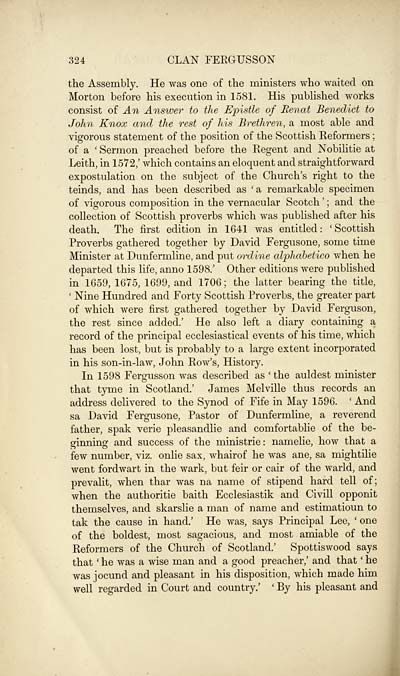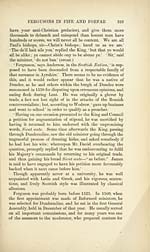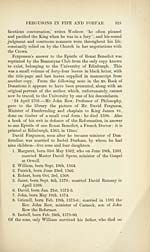Download files
Complete book:
Individual page:
Thumbnail gallery: Grid view | List view

324 CLAN FERGUSSON
the Assembly. He was one of the ministers who waited on
Morton before his execution in 1581. His published works
consist of An Answer to the Epistle of Renat Benedict to
John Knox and the rest of his Brethren, a most able and
vigorous statement of the position of the Scottish Keformers ;
of a ' Sermon preached before the Regent and Nobilitie at
Leith, in 1572,' which contains an eloquent and straightforward
expostulation on the subject of the Church's right to the
teinds, and has been described as 'a remarkable specimen
of vigorous composition in the vernacular Scotch ' ; and the
collection of Scottish proverbs which was published after his
death. The first edition in 1641 was entitled: 'Scottish
Proverbs gathered together by David Fergusone, some time
Minister at Dunfermline, and put ordine alphabetico when he
departed this life, anno 1598.' Other editions were published
in 1659, 1675, 1699, and 1706 ; the latter bearing the title,
' Nine Hundred and Forty Scottish Proverbs, the greater part
of which were first gathered together by David Ferguson,
the rest since added.' He also left a diary containing a
record of the principal ecclesiastical events of his time, which
has been lost, but is probably to a large extent incorporated
in his son-in-law, John Row's, History.
In 1598 Fergusson was described as ' the auldest minister
that tyme in Scotland.' James Melville thus records an
address delivered to the Synod of Fife in May 1596. ' And
sa David Fergusone, Pastor of Dunfermline, a reverend
father, spak verie pleasandlie and comfortablie of the be-
ginning and success of the ministrie: namelie, how that a
few number, viz. onlie sax, whairof he was ane, sa mightilie
went fordwart in the wark, but feir or cair of the warld, and
prevalit, when thar was na name of stipend hard tell of;
when the authoritie baith Ecclesiastik and Civill opponit
themselves, and skarslie a man of name and estimatioun to
tak the cause in hand.' He was, says Principal Lee, ' one
of the boldest, most sagacious, and most amiable of the
Reformers of the Church of Scotland.' Spottiswood says
that ' he was a wise man and a good preacher,' and that ' he
was jocund and pleasant in his disposition, which made him
well regarded in Court and country.' ' By his pleasant and
the Assembly. He was one of the ministers who waited on
Morton before his execution in 1581. His published works
consist of An Answer to the Epistle of Renat Benedict to
John Knox and the rest of his Brethren, a most able and
vigorous statement of the position of the Scottish Keformers ;
of a ' Sermon preached before the Regent and Nobilitie at
Leith, in 1572,' which contains an eloquent and straightforward
expostulation on the subject of the Church's right to the
teinds, and has been described as 'a remarkable specimen
of vigorous composition in the vernacular Scotch ' ; and the
collection of Scottish proverbs which was published after his
death. The first edition in 1641 was entitled: 'Scottish
Proverbs gathered together by David Fergusone, some time
Minister at Dunfermline, and put ordine alphabetico when he
departed this life, anno 1598.' Other editions were published
in 1659, 1675, 1699, and 1706 ; the latter bearing the title,
' Nine Hundred and Forty Scottish Proverbs, the greater part
of which were first gathered together by David Ferguson,
the rest since added.' He also left a diary containing a
record of the principal ecclesiastical events of his time, which
has been lost, but is probably to a large extent incorporated
in his son-in-law, John Row's, History.
In 1598 Fergusson was described as ' the auldest minister
that tyme in Scotland.' James Melville thus records an
address delivered to the Synod of Fife in May 1596. ' And
sa David Fergusone, Pastor of Dunfermline, a reverend
father, spak verie pleasandlie and comfortablie of the be-
ginning and success of the ministrie: namelie, how that a
few number, viz. onlie sax, whairof he was ane, sa mightilie
went fordwart in the wark, but feir or cair of the warld, and
prevalit, when thar was na name of stipend hard tell of;
when the authoritie baith Ecclesiastik and Civill opponit
themselves, and skarslie a man of name and estimatioun to
tak the cause in hand.' He was, says Principal Lee, ' one
of the boldest, most sagacious, and most amiable of the
Reformers of the Church of Scotland.' Spottiswood says
that ' he was a wise man and a good preacher,' and that ' he
was jocund and pleasant in his disposition, which made him
well regarded in Court and country.' ' By his pleasant and
Set display mode to:
![]() Universal Viewer |
Universal Viewer | ![]() Mirador |
Large image | Transcription
Mirador |
Large image | Transcription
Images and transcriptions on this page, including medium image downloads, may be used under the Creative Commons Attribution 4.0 International Licence unless otherwise stated. ![]()
| Histories of Scottish families > Records of the clan and name of Fergusson, Ferguson and Fergus > (370) Page 324 |
|---|
| Permanent URL | https://digital.nls.uk/95330603 |
|---|
| Description | A selection of almost 400 printed items relating to the history of Scottish families, mostly dating from the 19th and early 20th centuries. Includes memoirs, genealogies and clan histories, with a few produced by emigrant families. The earliest family history goes back to AD 916. |
|---|

